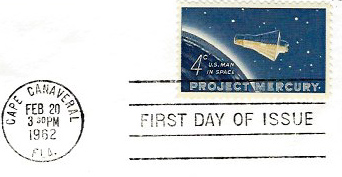“You couldn’t pay that officer too much attention,” said Bowling Green’s Martha Potter, when Lt. Col. John H. Glenn, Jr., became the third American to go into space (after Alan Shepard and Virgil “Gus” Grissom) and the first to orbit the earth. One of the original “Mercury Seven” astronauts, Glenn circled the earth three times during his five-hour flight on February 20, 1962.
Like all Americans, Martha was transfixed, even though numerous delays had postponed the flight. “I got [up] at five o’clock the first morning [January 27] he was to make his trip,” she wrote her children. “The TV was working fine and I saw him get in his capsule and was still watching when he came out.” On the day of the successful launch, she had invited some friends over to play cards, but the group quickly turned to the unfolding event. Martha “lived at the TV” until late evening and in the days afterward, when Glenn was feted with a ticker-tape parade.
In Washington, Kentucky Congressman Frank Chelf joined the chorus of praise for Glenn. On February 26, he introduced a bill to award Glenn and his fellow Mercury Seven astronauts the Congressional Medal of Honor plus a bonus of two years’ salary. A version of his idea became law in 1969, when Congress authorized the Congressional Space Medal of Honor for astronauts who distinguished themselves in the space program.
In recognition of the many contributors to the milestone, Chelf’s bill also provided $5,000 to each of the scientists, engineers and technicians associated with the mission. Glenn himself was the first to credit the “team effort of many, many thousands of people” behind Project Mercury. A thank-you letter written on his behalf to Bowling Green native Lillie Mae Carter and her first-grade pupils in Toledo, Ohio put his pioneering feat in perspective: “Many things were learned from this and from the earlier flights of Alan Shepard and Gus Grissom,” it noted. “Each flight is a stepping-stone in our ever-expanding manned space flight research program.”
Click on the links to access finding aids for these collections featuring the late John Glenn in the Manuscripts & Folklife Archives section of WKU’s Department of Library Special Collections. For more collections, search TopSCHOLAR and KenCat.

